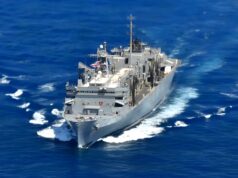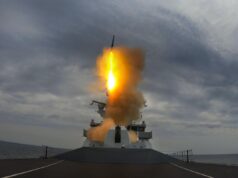A new agreement announced by Defence Minister Maria Eagle will significantly improve the readiness of the UK’s warships and submarines.
According to a press release from DE&S, the initiative is also expected to assist economic growth across the UK by giving small and medium-sized enterprises (SMEs) greater access to Ministry of Defence (MOD) contracts.
The seven-year framework, valued at up to £850 million, falls under the Marine Systems Transformation (MaST) programme. This programme is designed to provide support and spares for non-combat equipment aboard UK warships and submarines, covering an extensive range of 180,000 items, from propulsion systems to galley equipment.
The agreement is structured to enable direct engagement with SMEs, allowing them to bid for work and support the Royal Navy’s operational needs.
Defence Minister Maria Eagle highlighted the importance of this initiative, stating, “The spares and repairs that keep our warships and submarines at sea are critical, and this agreement will ensure that more British small businesses – from Southampton to Aberdeen – will be at the heart of supporting the Royal Navy.” She further emphasised that the agreement not only contributes to national security but also supports over 200,000 jobs across the country.
The new framework opens the door for 39 companies to bid for contracts through Defence Equipment & Support (DE&S), the MOD’s procurement arm.
The press release notes that this will lead to improved warship and submarine availability through better access to spare parts for both planned and unplanned maintenance, specialist equipment-related technical advice, and expertise on a global scale, all while aiming to reduce costs without compromising safety or availability.
Toni Gray, Navy Acquisition, Equipment Support Programmes Director, was quoted in the release saying, “The MaST frameworks will deliver vital spares, repairs, and post design services to support the Royal Navy’s fleet of ships and submarines. The frameworks will widen our market, enable us to contract direct to SMEs, and critically, offer never seen before levels of customer choice to how we sustain our key equipment.”
Dr Simon Dakin, Director General – Core at DE&S, referred to the MaST frameworks as “a game-changer to spares procurement and in-service support to Royal Navy warships and submarines.” He added that the framework would bring the necessary agility to respond to global events and maintain the operational schedule while ensuring cost-effectiveness in procurement.
The announcement was made during Minister Eagle’s visit to Somers Forge in the West Midlands, a manufacturer of bespoke naval parts and one of the businesses set to benefit from the new framework.
Samson Folkes, Managing Director of Somers Forge, expressed his enthusiasm, stating, “Being selected for the MAST framework represents a huge opportunity for our business. We have been a defence supplier since 1912 and are incredibly proud of our heritage supporting the Royal Navy.” He noted that winning contracts through MaST could help sustain jobs and apprenticeships in the Midlands while supporting the company’s growth ambitions.














Yes really look forward to seeing the “big” players allowing themselves to be cut out of the supply chain and missing their cut.
Lets see how it pans out.
Hmmme
Well to a certain extent it is a lot of bother and overhead to support inventories of 10k’s of parts. Some of which are low cost so however fat the margin appears to be are a waste of time for BigCo to sell because the overhead for handling them is so massive.
Historically there were warehouses full of parts counts that were set aside to support the units of (whatever) for the projected full service life. This lead to bonkers things like having a whole load of spare propellors for T42’s sat in a warehouse when they were taken out of service and may other parts too.
BigCo should focus on the parts where they are doing specialist manufacturing or assembly and leave the rest of it to the MaST suppliers.
I know this will grind a few gears with some of the old timers but that way of working has been fading anyway as MoD has been refusing to fund spares stockpiles and keeping some lines open where there isn’t a clear (short term) case for it.
Exactly this, high turnover low-cost equipment is a constant thorn for maintainers and logisticians. Bridging the gap between massive contracts and small scale local purchasing has been a high priority for Fleet Support for some time. Trying to expand through the bureaucracy of the relationship between the 17x strategic suppliers and DE&S has clearly been burdensome (we’ve been talking about it for years). As you say, trying to get a multi-billion defence conglomerate to give a damn about sub-£100K contracts has been near-impossible. This is genuinely a real win for the Fleet and for the 39 companies who now have access to bid and provide support. More of this kind of thing! It may not be the sexiest headline we’ve ever seen but it should make a tangible difference.
Although, to reply to myself… I wonder how long those companies will exist before getting takeover offers from the big 17???
That is the problem when they get to look juicy; need investment; have a cash flow crunch – BigCo to the rescue!! and over consolidation starts all over again.
If D&ES provided a Supplier Self-Service Portal, they would be better able to stand alone having been relieved of significant IT costs..
Except the IT would go to CRAPITA or other useless nightmare contractors….
Yes, that’s a concern however the cloud ERP systems available for these processes as commercial off the shelf packages have a set of implementation partners who mostly are not in the Capita mold. They are subject to governance by the ERP developers.
There’s always risk, but that’s why experience not low day rate matters.
Yes and…..
Post Office Horizon eventuated not because there wasn’t a banking core system that could have been used but because it was ‘cheaper’ to get ICL to develop….
A banking core could reconcile stuff.
Whilst the size of company is relevant to their capabilities and risk appetite, there’s very different Processes required to deal with different engineering challenges from ;
– prototype custom build (QEC),
– low rate production (F35B),
– serial production (155mm Ammo),
– bulk production (washers)
just to give a short list for example.
So big-co can and does invest in the IT systems to support a range of Processes relevant to their business plans and investment mindset.
SMEs are more restricted so likely to invest in a small to one set of Processes that support their business. A self-employed specialist may survive with only generic IT tools; email, docs, sheets, slides of little relevance to corporate Processes.
Having worked for big-co and seen their struggles with SME and SE suppliers over decades, I believe that D&ES have missed a huge opportunity to successfully engage with not big-co enterprises.
Specifically a supplier self-service portal that provides the material management and procurement functions that they don’t have, or even if they do, the consistency required to get excellent results. This also avoids the cost and delay of adopting a new supplier through the B2B integration route, which is the other SME option.
Since Commercial Off The Shelf IT systems are available for this, it’s a low risk option with the right implementation partner, some of whom are in the UK.
Well if this is a sign that the MoD is trying to sort out procurement it is goods news.
Unfortunately, with the entire SSN fleet alongside waiting for maintenance / refits it is starting to look a lot like too little, too late. The SSN submarines are our most capable conventionally armed weapons and they are ALL tied up alongside apparently unable to move because the required dockyard infrastructure upgrades were delayed during austerity… SME’s are not going to help with those boats that need dry docking.
Peace dividend is starting to look like an almighty huge overdraft on national security.
CR
CR, As was discussed on a previous post, or possibly on LinkedIn, there was a time when a Supply Manager would have been all over this, and the ship lift cables would have been on order before they failed and the original makers had gone out of business.
Hope all is good with you
Mark
Hi mate,
Yeh not too bad thanks. Hope all is well with you.
It seems there are multiple issues coming home to roost. Ship lift, dry docks, etc. Short term delays to maintenance or infrastructure have a tendency to bite back with higher costs, direct and or indirect, when the issue finally needs to be dealt with. Kicking decisions down the road is never a good idea, especially time sensitive ones.
Your point about the Supply Manager highlights another issue we face. After years of paring back budgets and staff there is a skills and experience gap. I have pointed out on here many times that it takes years for an engineer to complete their training and develop experience they need to be able to deliver complex engineering projects. This all speaks to a need to rebuild our industrial base as well as the procurement base with enough of the right people in the right roles with the resources they need to make a difference.
It will take time, which is the kicker as geopolitical risks are at highest level since the early 80’s.
Cheers, take care mate,
CR
If you think the issuea are only dockyard infrastructure upgrades i have a bridge to sell you.
Pssst, don’t mention Bridge on here, I mentioned it once, think I got away with it. 👀
Bridge for sale?? Na that ones passed me by, mate.
The USN /NAVSEA have something similar. They get Small companys to bid for lower cost jobs. Lots of companies employing Vets etc.
However…
It has issues
Known as mom and pop businesses some dont have the backup of the larger companies.
They want cash up front because of cash flow and they struggle to deliver what they promise on especially if the bid is a loss leader that they know is underpriced so that they can then get growth.
A person I knew a while back spent his days researching the history, finances, capabilities and viabilities of each and every company supplying or potentially suppling any service, part or process, He had the power to pull the plug.